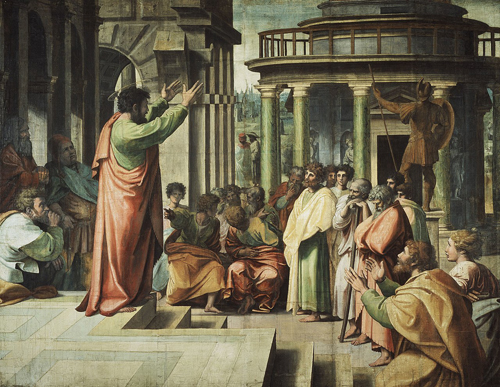
Your complimentary articles
You’ve read one of your four complimentary articles for this month.
You can read four articles free per month. To have complete access to the thousands of philosophy articles on this site, please
Editorial
Return to God?
by Rick Lewis
“And the people bowed and prayed,
To the neon God they made”
Simon & Garfunkel, The Sound of Silence
“Return to God?” you ask, with exasperation or hope or some other fine emotion, depending upon your temperament and your theological opinions. Gentle reader, I was pulling your leg a little bit, as I meant the title of the editorial more in the sense of “Shall we Return to the topic of God?” I am not about to invite you to a revivalist meeting. Instead, I invite you to read a selection of articles, from a variety of viewpoints, dealing with these ancient and profound questions: Does God exist? And if he does, what is his nature?
Religion has been a part of human culture for tens of thousands of years, if not more, and a major focus of philosophical debate within all of the world’s cultures ever since philosophy first began. Indeed, some of the points raised by ancient Greek philosophers still have resonance today, among them the Problem of Evil, the Euthyphro dilemma in Plato’s dialogue of that name, and the observation by Xenophanes that different societies tend to worship gods that resemble themselves. Soon after Christianity’s beginnings, St Paul addressed an audience of Greek philosophers on the Areopagus in Athens. His clever and philosophical speech apparently failed to persuade most of his listeners to embrace the new religion – there may even have been some heckling – but Paul had the last laugh. Within four centuries philosophy in the West had become overwhelmingly Christianised. By then, the greatest minds such as Pelagius and St Augustine were clashing fiercely over questions of free will and salvation, demonstrating that philosophy had become centred on disputes within Christianity. So things continued for many centuries – except that Islamic and Jewish philosophy blossomed too, with their own concerns but linked by their common religious heritage and shared belief in a single all-powerful Creator. Even after the Enlightenment, the existence and nature of God remained a central concern of philosophers such as Descartes, Spinoza and Leibniz. Only from the 18th century on did some philosophers become increasingly open about their religious scepticism – thinkers such as David Hume and later Friedrich Nietzsche. By the twentieth century, philosophy was mostly secular, as was society at large.

Raphael’s 1515 painting of St Paul preaching in Athens
This editorial is ‘Return to God?’ but the title we’ve given to the themed section of this issue is ‘The Return of God’. Upon such apparently trivial grammatical differences, history has often turned! In this case, what we mean by The Return of God is something more like this. In the late 19th century, philosophy’s bad boy Friedrich Nietzsche shocked the world with his famous assertion in Thus Spoke Zarathustra that “God is dead”. What he meant (it seems) was not the literal death of a divinity, but that the power of faith was evaporating from society, leaving his contemporaries without an anchor and without a divinely ordained purpose or a divinely ordained basis for morality. It was a radical claim in the 1880s, but within a few decades its truth seemed obvious to many.
But now what? Today it seems harder to argue the irrelevance of religion. For billions of the inhabitants of this little world, it has immense power, defining their moral choices, not to mention their cultural and political identities. Hence the return of God as an important topic of philosophical debate, and a necessity for understanding these turbulent times.
We have two articles on atheism – one providing a survey of its main points, and another giving a fierce critique of it. We have a fascinating piece on two medieval Islamic philosophers with contrasting ideas about God’s nature. And we have three articles that in three very different ways consider the notorious Problem of Evil: why would an all-loving God who was also all-powerful and all-knowing permit the existence of so much dreadful suffering in the world? What can we deduce about God’s nature from that?
Also in this issue we have a couple of articles focusing on social media, fake news, trolling and its implications for theory of knowledge. But are those questions really so distinct from our ‘return to religion’ theme? These days people constantly carry phones in their pockets and bow their heads over their little glowing screens more often than the most devout Puritans ever consulted their scriptures. Your phone, after all, seems to contain pretty much all knowledge, and omniscience is one of the key attributes of God. What about omnipotence and omnibenevolence? Well, for those you’ll just have to wait for the next upgrade.









